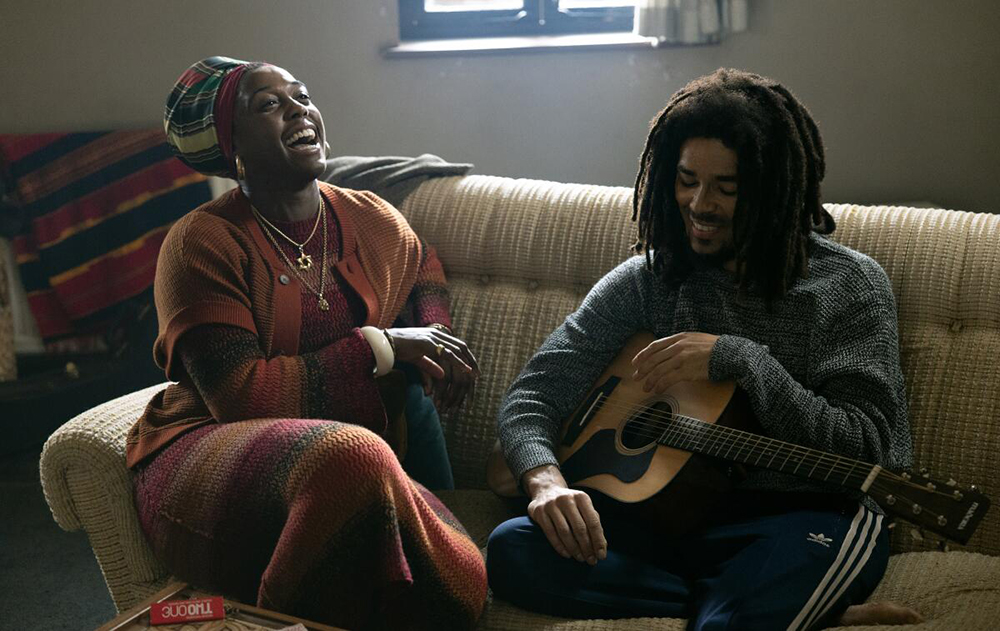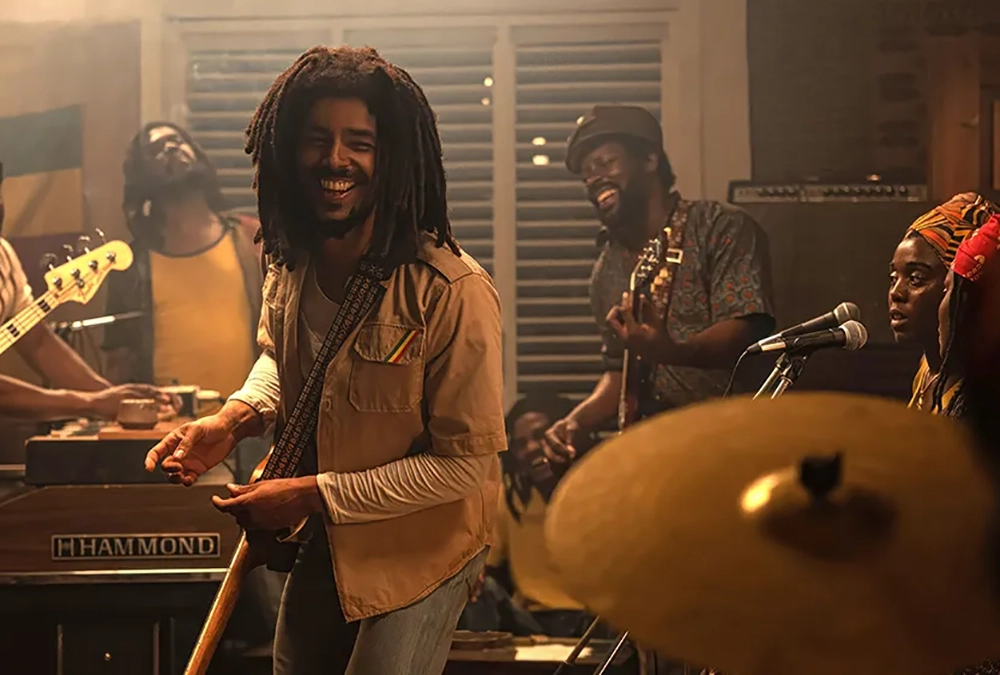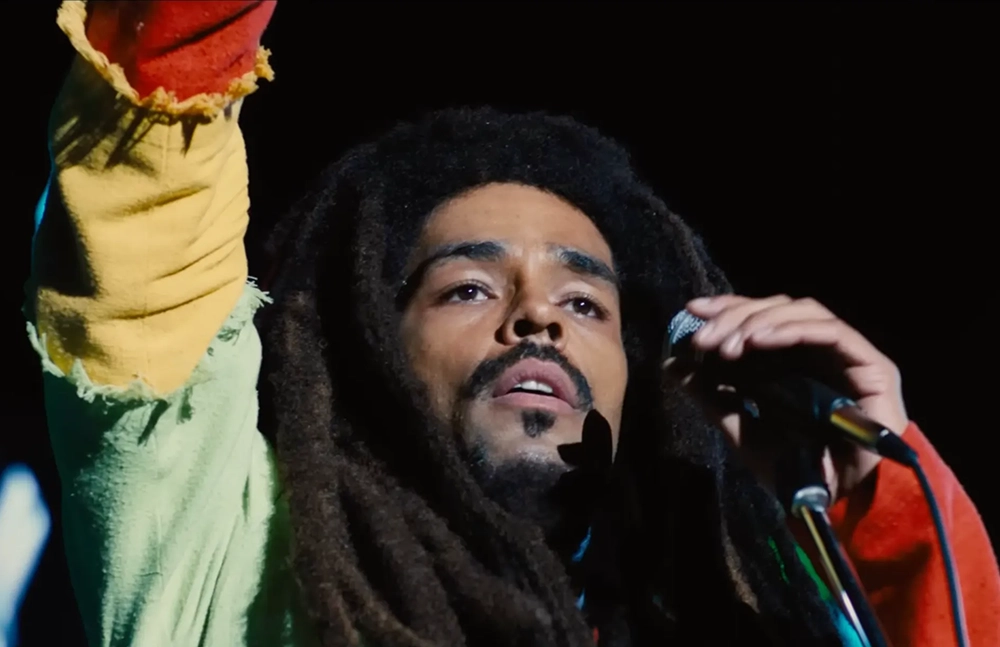When we first meet Marley (Kingsley Ben-Adir in a transcendent performance), he’s at a press conference with his manager, Don (Anthony Welsh). People want to know if he’s still planning to play an upcoming peace concert—the immortal ‘Smile Jamaica’ festival—despite political tensions, violence, and threats. Marley is political—make no mistake about it. But he’s a peace advocate, and weaves and skirts the questions as best he can. That night two political extremists would break into Marley’s home, shooting and wounding Marley, his manager, and his wife. The clincher on this scene, and Marley’s integrity, is the moment when he locks eyes with the assailant before he pulls the trigger. It’s not fear Marley feels, nor anger; he looks at the man with a sad entreaty, almost as a silent “it’s okay.”
Marley Amidst a Struggling Jamaica
“One Love” weaves along in this way, centering on Marley and his Wailers (his wife, Rita is part of the group, Lashana Lynch in an excellent portrayal) as they make music, records, and more. But Director Reinaldo Marcus Green doesn’t paint a straightforward path, but one we have to feel and earn. The actors’ strong, Jamaican accents could have been subtitled for viewers’ ease—as could have following Marley as a boy as he grew into a star—but we would have lost something along the way. Green throws us in, asking us to immediately tread water, and by the end I was eager to, glad to follow this film and its characters as they learn, stumble, and grow.
In this way, it feels amiss to criticize “One Love” for coming up short as a biopic, because it’s so much more than that. To paint the intricate Jamaican landscape of the 1970s—along with Marley’s rise—would have taken a 3 hour plus run-time, and run the risk of telling instead of showing. By starting when Marley is already a star, and centering on the band and Marley’s personal life amidst an uneasy culture, it allows us to feel his struggle. Part of the ease of this is the work Ben-Adir put into the role, one of the best performances I’ve seen in a biopic, bar none. I think most fans would have a hard time picturing anyone playing Marley. And while the film starts that way, in short time I forgot I was watching a representation and went with it smoothly. I grew up falling in love with “Legend,” Bob Marley and the Wailer’s greatest hits, but never spent much time thinking about what went into those songs, and what political climate Marley and crew wrote them in.
Music, Joy, and Pain

What works about “One Love” is that for such a celebrated band, their practice rehearsals, songwriting, and recordings feel intimate and like family. They work as a unit, a factor that doubtless sprung from Marley’s belief in Rastafarianism, of “one people.” One of my favorite parts of the film involves an interviewer asking him if he thinks humans can make it. There’s no anger on his face, but only a hopeful contemplation as he replies, “we have to.” There’s a simplicity and hope to his logic that Ben-Adir sells with ease. But Green’s film doesn’t wish to just idolize Marley, but look into his heart. Adversity strikes him at many turns (an arrest in London and violence in Kingston being the most stark). But watch him as he spontaneously writes “Redemption Song” or a scene where Rita comments on a love song he writes, urging him to hold on to that part of himself. Political songwriting and urges for peace consumed him at times, at her entreaty and knowledge of his soul is a moment of bliss amidst the pain.
The soundtrack for the film is stellar, featuring most of the band’s greatest hits, but underscored and arranged for different scenes in an intimate way. The sound and music arrangements (Kris Bowers did the music) are joyous and celebratory. Some renowned tracks such as “Jamming” and “Exodus” are included as part of band rehearsals. Meanwhile “No Woman No Cry” scores one of the harder parts of the film, while “Redemption Song” one of the most tender.
A Historical and Emotional Film

The film is enhanced upon learning that Marley’s son, Ziggy, approved Ben-Adir’s casting and oversaw the film for authenticity, but that Ben-Adir also sang for the film. His voice is magical, imbuing what you feel is Marley really singing, although the film’s concert scenes feature a blend of Marley and Ben-Adir’s vocals. The way the sound department weaves and transitions is seamless, and he joins Taron Egerton of “Rocketman” fame for killing it in the singing department.
Additionally, the concerts are a joy to behold, and as the band’s album “Exodus” went gold, you can feel their elation along with them. And the film’s close—as Marley holds a concert as he returns to Jamaica—feels exuberant. As captions inform of his accomplishments, as well as his death (interwoven with clips of the real Bob Marley and the Wailers), the film leaves a bittersweet yet emotional experience that stays with you.
A Film to Revisit
At the end of the day, “One Love” is a great experience. It has its criticisms—mostly its short run-time and the fact that it tries to cover such an intricate and complicated period of history along with a biopic—but to me, it’s all forgivable. The film sides you with Marley through his joy, hope, despair, and anger, without endorsing or forcing any of them. It touches on Marley’s battle with cancer without providing answers to the often-conspiratorial topic. Marley’s relationship to Jamaica, to his wife, and to Rastafarianism are felt rather than told, and ends with the redemption he tried so hard to foster. Its criticisms seem misplaced (a ‘rotten’ 42%), while its audience score of 95% seems more authentic. “One Love” didn’t alter my love of Marley’s music, it enhanced it. Listening to “Exodus” today from start to finish, I thought of the man and his struggles and undying hope more than its reggae chords and beats. It’s a film about history and about a man, and one I will need to revisit to appreciate for all its intricacies.
“Bob Marley: One Love” is currently available to watch in theaters.



